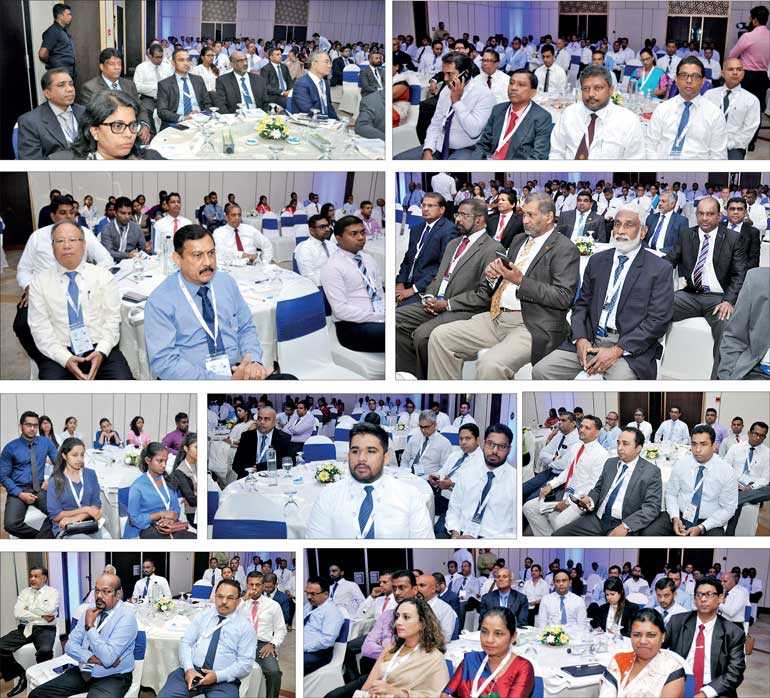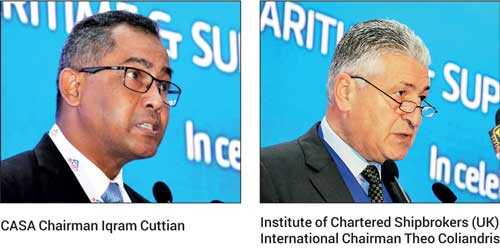Friday Feb 27, 2026
Friday Feb 27, 2026
Monday, 30 September 2019 00:00 - - {{hitsCtrl.values.hits}}

Ports and Shipping Minister Sagala Ratnayaka

By Charumini de Silva
Ports, Shipping and Southern Development Minister Sagala Ratnayaka last week said the global maritime industry has been pushed into unchartered waters to meet its challenges head-on, in seeking long-term and sustainable solutions for the planet and wellbeing of future generations.
“The global maritime industry I feel is now at a crossroads. We have to admit the impact on shipping in terms of cost to protect the environment will be the biggest in history. However, this is a cost we have to bear for the sustainability of our planet and for the wellbeing of future generations,” he said, speaking at the CASA-ICS (UK) Maritime and Supply Chain International Conference held in Colombo to mark World Maritime Day declared by the International Maritime Organisation (IMO). 
The Minister pointed out that the industry was moving full steam ahead towards overhauling how ships get their power. Maritime environmental efforts have resulted in the implementation of a mandate starting on 1 January 2020, to drastically reduce maritime sulphur emissions, which, according to scientists, pose a severe environmental threat.
“As we speak, the maritime industry across the world is facing multi-pronged challenges. The entire world is mired in the effects of climate change. Our industry will have to go to extraordinary lengths to fulfil our environmental responsibilities and obligations. This transformation may not be a cakewalk by any means,” he said.
Ratnayaka said ships would have to use cleaner fuels that are still under development and may cost up to 50% more than traditional fuel known as bunker, or they will have to be fitted with sulphur-trapping exhaust systems called scrubbers that go for as much as $ 10 million per vessel.
On 1 January, he said some 60,000 ocean-going vessels would have to cut their sulphur emissions by more than 80% — the first in a series of steps the global maritime industry will take in the coming years.
The Minister also reasserted that IMO members had agreed to slash greenhouse gas emissions in half by 2050, compared with 2008’s levels. This is in keeping with the Paris Accord in 2016, which was a key milestone in the collective battle against climate change.
“It is important to understand that ships now contribute up to 3% of the world’s global pollution, an amount comparable to that of major emitting countries. This underscores the importance of remedial measures that the industry must adopt to mitigate the impact, amidst severe and unprecedented challenges.”
While acknowledging that challenges were omnipresent and inevitable, Ratnayaka said it was critical to turn these into opportunities and broaden the horizons of the industry.
“This, needless to say, will push carriers into uncharted waters in terms of operating costs and fundamental questions, including what will power the vessels of the future. There are also concerns from shipping customers over how costs will be shared across supply chains. These are the questions to which we must find answers to on platforms of this nature. There is no turning back. We must meet the challenges head-on and seek long-term and sustainable solutions,” he added.
Ratnayaka also said empowering women was another important challenge that we must surmount as a community. This year’s theme for World Maritime Day ‘Empowering Women in the Maritime Community’ points to a timely initiative which the Minister believes will have a substantial impact on the qualitative growth of our industry.
Noting that a lack of gender balance in the maritime sector had remained a pressing issue for many years, he said this year's theme highlighted that we must pursue meaningful action to ensure gender balance in the local sector, which involves empowering women who bring value to this dynamic industry.
As policymakers and industry leaders, the Minister said it was our responsibility to support the participation of women in both shore-based and seagoing posts, in line with the goals outlined under the United Nations Sustainable Development Goals (SDGs) which promotes achieving gender equality and empowering all women and girls.
“This requires an inclusive environment in which women are identified and selected for career development opportunities in maritime administrations, ports and maritime training institutes. Such an environment will enable women to train alongside men in their maritime institutes with access to high-level technical training,” he added.
Ratnayaka said the most important aspect of empowering women is that it unfailingly fuels economic growth and development and benefits every level of society.
Needless to say, the maritime sector offers many high-value jobs and opportunities to capable women who will take our industry to new heights in the years to come.
In Sri Lanka, he said there are invaluable initiatives that promote women’s participation in the maritime sector, but it was still a work in progress.
”As the Government, we are deeply committed to extending our full support to transform the maritime industry into a thriving industry for women,” he assured.
- Pix by Lasantha Kumara